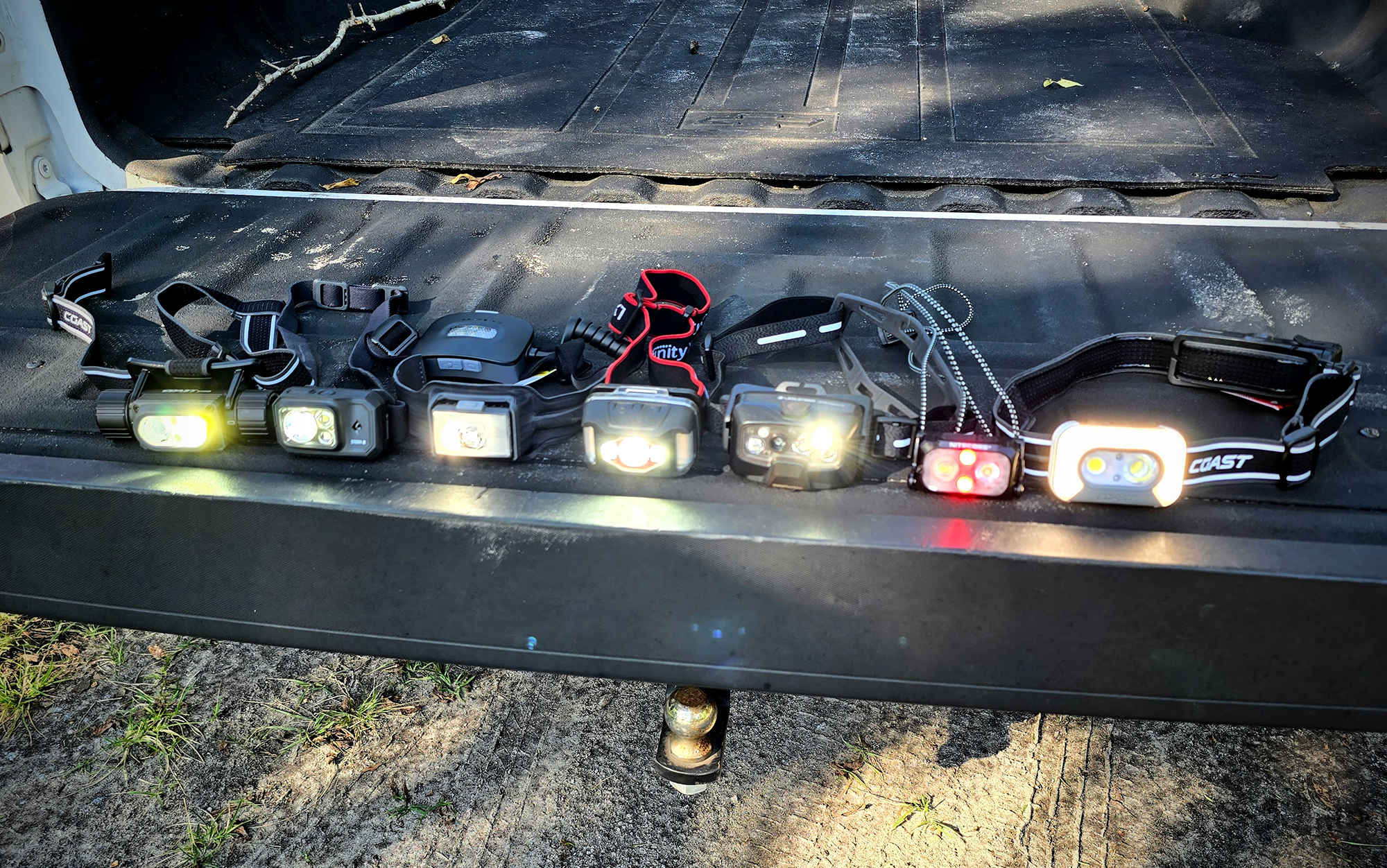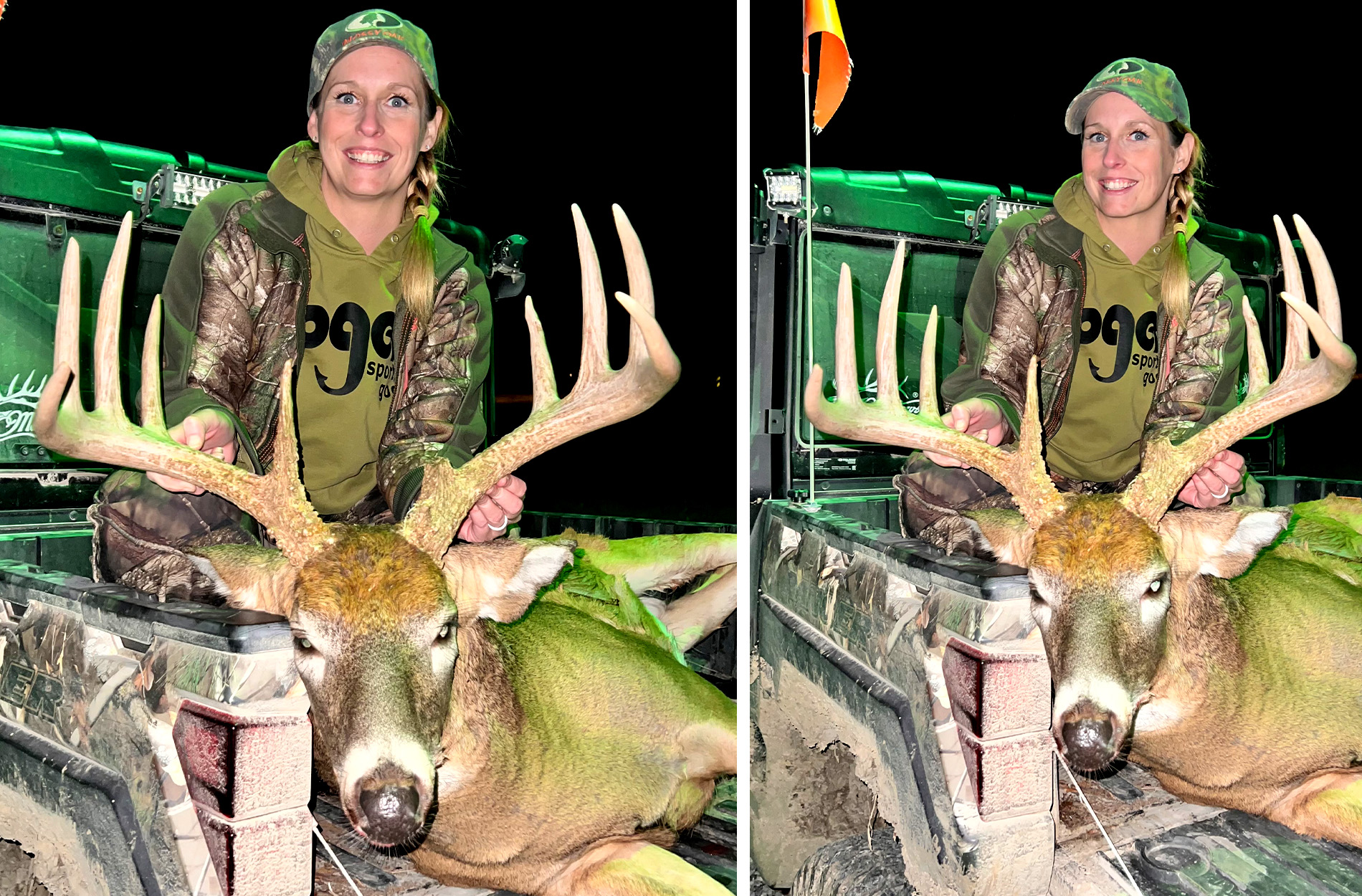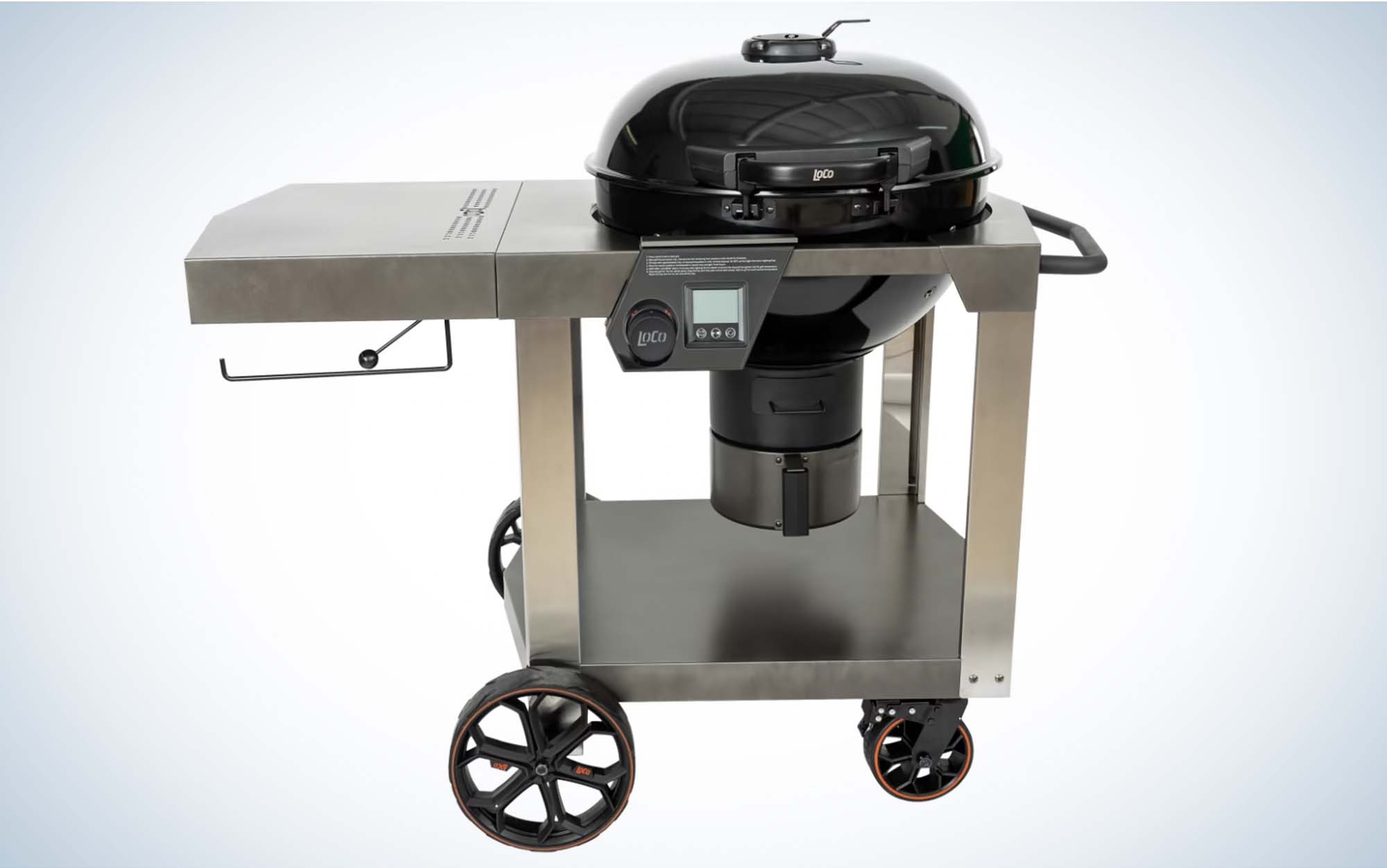Best Headlamps for Hunting of 2024

We may earn revenue from the products available on this page and participate in affiliate programs. Learn More ›
A reliable headlamp is a godsend when you’re sneaking through the predawn woods during turkey season, crossing a creek to get to your favorite treestand, or hoofing it back to a backcountry basecamp. There are hundreds of quality headlamps on the market, but not all of them work well for hunting situations.
Wading through the sheer number of options can be confusing and suck up time better spent on pre-season scouting. To save you some hassle, I did extensive side-by-side testing to help you decide which headlamp you should carry into the woods this hunting season.
How I Tested the Best Headlamps for Hunting
While having a solid and reliable headlamp is a boon for any outdoor activity, hunters are notoriously hard on gear. There are also a few key features hunters need in a light source that regular hikers and campers can simply take or leave. I tailored my testing to simulate scenarios hunters are likely to encounter in the field.
Light
A headlamp’s main job is to light up the darkness. Rather than just looking at lumens on product packaging, I took headlamps into the woods to see just how well they work in the field. I used each headlamp on a wooded trail and compared intensity and tightness of beams on a stationary 30-yard target.
Battery Life
Nothing is worse than leaving a treestand and starting a long hike back to the truck with a rapidly fading headlamp. To test battery life, I turned each test model on its highest setting, then sat back and waited for them to die. I timed the process and that information is included in the key features section for each product.
Impact Resistance
Like a lot of deer hunters in the Southeast, my gear spends a lot of time in a treestand, and it occasionally swan dives from the platform. I tossed each test lamp from a 20-foot ladder stand onto a 1/4-inch plywood panel. To make the cut, the headlamp had to survive the fall without suffering severe damage to the housing.
Comfort and Adjustability
I wore each headlamp on a short, 1/4-mile hike, both with and without a hat. I assessed the comfort of each headlamp, its ability to stay in place, and how easy the headband was to adjust.
Weather and Cold Resistance
I placed each headlamp in my chest freezer next to some vacuum-sealed packs of venison steaks for one hour. I also sprayed each headlamp with my garden hose to test water resistance. Each of the models that made my list survived both the freezer and the garden hose.
Controls
Modern headlamps usually offer far more than a simple on/off switch. When you’re in the woods, being able to make quick lighting adjustments is essential. I assessed how intuitive each headlamp was to operate.
Best Headlamps for Hunting: Reviews & Recommendations
Best Overall: Black Diamond Storm 500-R
See It
Key Features
- Weight: 3.1 ounces
- Lumens: 6 (low), 250 (medium) 500 (high)
- Settings: Seven modes, including red, green, and blue
- Max Beam Distance: 394 feet
- Tested Total Run Time: 7 hours 15 minutes
- Water Resistance: IPX67
- Rechargeable
- Price: $75
Pros
- Lightweight, compact body
- Brightness memory
- Second longest battery life in the test
- Highly intuitive controls
- Lock option
Cons
- Touch-sensitive button sometimes triggers accidentally
- Band is difficult to adjust
The Black Diamond Storm 500-R didn’t earn top marks in my testing due to any gimmicky or high-tech features. What I love best about this headlamp is its simple, sturdy design. It took the plunge test like a champ, walking away without so much as a scratch.
I am a simple gal with simple needs, and as such, I value simplicity in a headlamp. To adjust light intensity, simply press and hold the textured main button and the light automatically cycles through the brightness settings. When it reaches the desired level, simply release the button and you’re good to go. That simplicity and the large, tactile button made the Storm 500-R easy to use with one hand.
The Storm 500-R isn’t bulky at all, and at just over 3 ounces, it doesn’t feel like I’m toting a boulder through the woods on my head. Although the band is basic, it does a fantastic job of holding the headlamp in place. However, adjusting the band is tricky and I wouldn’t want to do it in the dark on the fly.
My biggest beef with this headlamp is the touch-sensitive power boost. This feature allows you to instantly switch to full-power mode with a gentle touch to the side of the headlamp. A second touch returns it to the previous setting. That sounds like a handy feature until you accidentally blind a hunting buddy in the woods because you brushed the boost while adjusting the beam angle. The boost function is definitely cool, but I found myself mildly annoyed with how often I unintentionally set it off.
Best Budget: Infinity X1
See It
Key Features
- Weight: 3.2 ounces
- Lumens: 180 (flood), 500 (spot), 700 (spot and flood)
- Settings: Five modes, including red
- Max Beam Distance: 295 feet
- Tested Total Run Time: 5 hours 50 minutes
- Water Resistance: IPX5
- Hybrid design uses included rechargeable battery or conventional AAAs
- Price: $45 for three pack
Pros
- Super affordable
- Simple to use
Cons
- Bulky
- Uncomfortable without a hat
The Infinity X1 features four white light brightness modes and a hunter-friendly red light. Unfortunately, you’ll have to toggle through all of them to find what you want and then switch through them again to power off.
Of course, the Infinity X1 isn’t marketed as a feature-rich headlamp, so you shouldn’t expect it to act like one. If you like simple and don’t want to fork over a ton of cash on a headlamp, this one is definitely enough to get you to and from the treestand.
For an inexpensive headlamp, the Infinity X1 is surprisingly lightweight with an easy-to-adjust band. As far as comfort goes, it works well with a hat, but due to a lack of padding, the straight, hard-plastic housing can get uncomfortable in a hurry if you’re wearing it against a naked forehead.
I used the included rechargeable battery during testing, and it did surprisingly well, holding out for almost 6 hours, which is significantly longer than some of the more expensive models. It fought hard to stay on, raging against the dying of the light and slowly fading over the last hour.
Best Battery Life: BioLite 800 Pro
See It
Key Features
- Weight: 4.7 ounces
- Max lumens: 5 (low), 250 (medium), 500 (high), 800 (burst)
- Settings: Eight modes, including multiple red light settings
- Max Beam Distance: 443 feet
- Tested Total Run Time: 8 hours 45 minutes
- Water Resistance: IPX4
- Rechargeable
- Price: $100
Pros
- Slim, low-profile design
- Well-balanced
- Multiple red light settings
- Comfortable, moisture-wicking headband
- Battery life indicator
Cons
- Controls are complicated
- Written directions unclear
- Limited water resistance
During the battery test, the BioLite 800 Pro blew every other model out of the water, finally giving up the ghost an impressive 8 hours and 45 minutes from switching on its highest setting. It features multiple brightness settings, including a blinding 800-lumen burst that lasts for 30 seconds. The lowest setting is paltry, offering only enough light to illuminate the inside of a tent. However, the 250-lumens medium setting offers a nice wide beam that isn’t overpowering and is near-perfect for navigating a trail. I tried the red setting to navigate my way through some off-trail brush and it offered a wide beam that was bright enough to avoid spider webs and low-hanging branches.
The BioLite 800 Pro has a separate battery pack on the back, which I thought would be annoying. While not exactly ponytail-friendly, the position helps distribute the lamp’s weight evenly. It is so balanced that I almost forgot it was there. The battery pack also functions as a red safety light that you can turn on and off. While this safety feature was intended for runners needing high visibility on roads and trails, it could also be a way for a trailing hunting buddy to keep up with your location as you move through the woods.
Packed with more modes and features than you could possibly need on one hunting trip, the BioLite 800 Pro is a relatively complicated headlamp. Understanding the included instruction manual requires a PhD in headlamps. I ended up tossing them and turning to the company’s instructional video for help. But even with the video, I haven’t completely mastered all of the modes. Adjusting brightness and color modes on this model is far from intuitive.
The Biolite 800 Pro has an IPX4 splash proof rating. It took the dowsing from my garden hose like a pro, but it isn’t made to go swimming. While it should be suitable for a rainy hunt, it isn’t one you want to drop in the river.
Best Lightweight: Nitecore NU25 UL
See It
Key Features
- Weight: 1.4 ounces
- Max Lumens: 400
- Settings: 12 lighting modes, including a red option
- Max Beam Distance: 210 feet
- Tested Total Run Time: 4 hours 24 minutes
- Water Resistance: IP66
- Rechargeable
- Price: $37
Pros
- Ultralight
- Simple controls
- Battery indicator
Cons
- Uncomfortable without a hat
The Nitecore NU25 UL features multiple lighting modes, including high, mid, low, spotlight, floodlight, beacon, SOS, and red light options. Although Nitecore promises a run time of 2 hours 40 minutes on high, this one held on far longer during testing. It kept chugging for 4 hours and 24 minutes, a full hour and 44 minutes longer than advertised. The headlamp also has an ultralow setting that emits 60 lumens and runs for up to 45 hours.
The lightweight, low-profile design of the Nitecore NU25 UL makes it an excellent option for hunters who need to keep pack weight low. The whole thing weighs less than an ounce and a half. Nitecore keeps the weight manageable by using a minimalist design and an ultralight elastic cord headband. Although the cord headband isn’t the most comfortable option for hatless wear, it feels almost like it isn’t there when you’re wearing a ball cap.
The NU25 UL has only two rubber-covered buttons, a small circular button turns it on. Once it is on, the power button also cycles through multiple light modes. A longer, textured button adjusts the intensity of each setting.
Brightest: Ledlenser HF8R Signature
See It
Key Features
- Weight: 5.8 ounces
- Max Lumens: 2000
- Settings: Blink, strobe, SOS, red, green, blue, multiple white brightness
- Max Beam Distance: 722 feet
- Tested Total Run Time: 5 hours 15 minutes
- Water Resistance: IP68
- Rechargeable
- Price: $118.97
Pros
- Adaptive, hands-free lighting adjustments
- Phone app lets you personalize features and control the headlamp remotely
- Great battery life
Cons
- Only charges with the included cord. Not compatible with standard USB options
- Forward heavy
- Expensive
Tipping the scales at almost 6 ounces, the Ledlenser HF8R Signature definitely isn’t a lightweight model. It’s relatively beefy and plenty forward-heavy. I constantly had to push back the brim of my hat because the weight of this headlamp kept sinking it down well past my eyebrows.
The HF8R Signature is so burly because Ledlenser needed the space to cram in a butt ton of technology. This model has a higher-than-average number of lighting options, including flash, strobe, red, blue, and green. It even has an option that flashes SOS in Morse code. What really packs some high-tech punch is Ledlenser’s patented Adaptive Light Beam Technology. The feature measures light, temperature, and lamp performance at 400 times a second and then makes instantaneous changes to the beam to suit specific lighting needs. It automatically and seamlessly transitions from flood to spot and everywhere in between.
That means the lighting is perfect when you look down to load your shotgun. Then, when you look up, the light will shoot across the marsh and light up trees 200 yards away without ever having to touch your headlamp. If you don’t like relinquishing control to a headlamp, you can always switch off the adaptive beam and take matters into your own hands.
The HF8R Signature uses a proprietary magnetic charging cord, which makes it easier to waterproof the lamp. However, having a dedicated charging cord adds to the tangle of random cords I keep stowed in my truck’s center console. It also means if I lose the cord, I’m basically SOL until I can order a replacement from the company.
Best Red Light: Coast WPH34R
See It
Key Features
- Weight: 7 ounces
- Max Lumens: 2000
- Settings: White, red, and green with five output modes
- Max Beam Distance: 590 feet
- Tested Total Run Time: 4 hours 27 minutes
- Water Resistance: IP68
- Hybrid design uses included rechargeable lithium-ion battery or three AAAs
- Price: $90
Pros
- Simple controls
- Super bright
- High-visibility red setting
- Detaches to become a handheld flashlight
Cons
- Very heavy
- Loud angle adjustments
The WPH34R features six distinct light modes — full, mid, low, spot, flood, spot and flood, red, and green. On its highest setting, this lamp can cast a beam a country mile. I’ve been in precisely zero hunting situations that required a 2000-lumen beam, but hey, you never know when you might need enough power to signal passing alien spacecraft. On low, this one puts out a much more practical beam and will run for up to three days. I am also in love with this headlamp’s red setting. It seems far brighter and more focused than the red settings on other models I tested.
You have to flip through the modes to find exactly what you want, which is fine if you like to create a party atmosphere at camp, but not so great if you need to make some covert lighting changes while slipping through the woods.
Weighing a full 7 ounces, you probably won’t want to lug this beast around the backcountry. Additionally, there’s no counterbalance, which means all of that weight hangs directly over your hat brim. This was one of the more uncomfortable headlamps I tested.
Best High-Tech: Coast RL35R
See It
Key Features
- Weight: 6.3 ounces
- Max Lumens: 1100
- Settings: White (spot and flood), blue, green, red
- Max Beam Distance: 613 feet
- Tested Total Run Time: 4 hours
- Water Resistance: IP68
- Rechargeable
- Voice-controlled
- Price: $100
Pros
- Responds to voice commands
- Easy-to-use button controls
- Multiple brightness and color settings
Cons
Unlike teenage children, the Coast RL35R headlamp listens to you, responding to specific voice commands that control light color and intensity. If your main goal in life is to impress your buddies at deer camp, this headlamp is a sure bet. While the RL35R wasn’t exactly an overachiever in light performance during my testing, it still managed to stack up well against the competition. Running on the highest setting, it lasted four hours, which is respectable, albeit quite a bit short of the advertised 6.75 hours.
While the voice command capabilities are this model’s claim to fame, it also has three easy-to-use buttons that allow you to scroll through lighting modes and power levels. It also features a dial on top that increases and decreases light intensity as you spin it. However, the voice control option works faster and more accurately than figuring out which button-pushing combination you need to get the mode you want. The feature responds well to everyone’s voice (which could put you in a pickle if you hunt with pranksters) and it even understands my sometimes thick southern accent. Do you need voice control on a headlamp? “Need” is a strong word, but I can definitely see the advantages of telling your headlamp what to do when you’re elbow-deep into field dressing a deer.
At 6.3 ounces, the RL35R is a relative beast. However, it positions the rather weighty battery pack at the back of the head for better balance and even weight distribution. For such a heavy headlamp, it is surprisingly comfortable.
How to Choose the Best Headlamps for Hunting
A solid headlamp will help you navigate terrain without spooking game, but it can also be a vital tool in tracking and recovering wounded animals in low light conditions. Here are a few important things to consider when choosing a hunting headlamp.
Brightness
The intensity of the light produced by a headlamp is measured in lumens. One lumen is approximately equal to the light generated by a single birthday candle. A 500-lumen lamp is plenty for most hunting situations. If all you need to do is get to and from a stand, especially in familiar terrain, using under 100 lumens is enough for lighting up a trail without frightening game. Anything over 1,000 lumens is overkill in most scenarios, although the extra brightness could be helpful if you want to illuminate a large area or need to signal for help. Most modern headlamps offer multiple brightness settings so you can switch between them based on your needs.
Beam
Lumens are just one factor in how well a headlamp lights up the night. The pattern and distance of the beam also affect usefulness. Beam distance refers to how far a headlamp casts light, while beam pattern is how the light is dispersed. A high-lumen headlamp won’t seem as bright if it disperses that light across a wide area in a flood beam. As the beam narrows and focuses on a smaller area, it may appear brighter because the light is more concentrated. A headlamp that offers a combination of both spot and flood beams provides more versatility.
Size and Weight
Since toting something big and bulky around the woods on your head isn’t anybody’s idea of a good time, the best hunting headlamps are usually compact and lightweight.
Battery Life
There are few things more disheartening than being miles away from civilization with nothing to light your way but a slowly fading headlamp. Getting stuck in the woods after dark is dangerous and scary.
Headlamps that use rechargeable batteries are convenient and can save tons of money. However, charging them should be quick and easy. Models that can use disposable batteries as a backup are a wise choice, especially if you hunt in remote locations where plugging into an outlet or USB isn’t an option.
A headlamp’s brightness plays a significant role in how long the batteries will last. Bright settings drain power quickly, while lower settings often burn for days. Keep this in mind when considering battery life. Personally, I’d rather have a dim headlamp than no light at all.
Red, Green, and Blue Light Modes
Hunters tend to have strong opinions about which light colors are best for hunting. White light may be easier for humans to see, but it is also highly visible to animals. Many hunters believe red light is less likely to spook game. Using a red beam also helps preserve your natural night vision, so you can see better in the dark once you switch off your headlamp. Some prefer green lights over red because they provide better distance vision and make it easier to read maps. A blue light can be a valuable tool for following a blood trail since it enhances contrast, making spatter pop against dry, brown leaves.
Durability and Water Resistance
Hunting often takes us into harsh, rugged conditions, so a durable headlamp is a must. A good hunting headlamp should be built to survive impact. It should also hold up in wet or rainy environments. Headlamp water resistance is rated on the Ingress Protection (IP) Scale. A lamp with an IPX4 rating is considered splashproof. Water resistance increases to IPX7, which is fully waterproof.
FAQs
What you should look for in a headlamp largely depends on how you intend to use it. A backcountry hunter will have very different needs than someone who rarely hunts more than a few hundred yards from the truck. Some things to consider are battery life, color and brightness settings, overall weight, and comfort.
The number of lumens you need from a headlamp is relative to your hunting situation. If you just need a light source to help you get to and from your deer stand without snapping too many sticks along the way, you can get by with a low-lumen lamp. Even headlamps that emit less than 100 lumens are usually bright enough for general hunting. However, you may need some extra brightness if you need to field dress an animal in the dark or need extra visibility to navigate dangerous terrain. A headlamp with 500 lumens should be enough for more demanding hunting applications.
The results of my testing and my experience in the field suggest the Black Diamond Storm 500R is the best light for deer hunting. Its brightness, battery life, and red light setting make it a smart option for pursuing both whitetails and muleys.
Final Thoughts on the Best Headlamps for Hunting
Hunters should be prepared for any situation day or night, whether they’re hunting the backcountry or their back forty. Even if you plan to be back at the truck by sundown, a downed buck, a wrong turn in the woods, or a twisted ankle on the hike out could keep you in the woods well past dark. In any of these situations, one of the best headlamps will quickly be your new best friend.
Read the full article here







